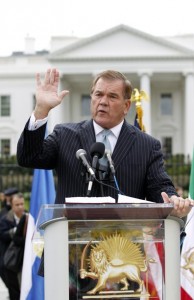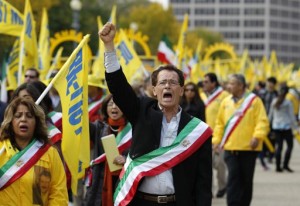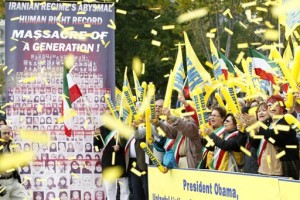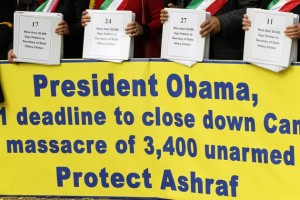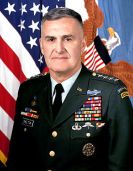THE NATIONAL INTEREST
If disinformation is defined as deliberate and covert efforts to plant false information to bias media reporting and intelligence collection, the UN’s Durban conferences constitute a prime example. Although organized around an “anti-racist” agenda, they focus on ways to delegitimize Israel and are an icon of intolerance.
A participant in the Durban conferences is the Islamic Republic of Iran. Just as it tries to delegitimize Israel, Iran does the same to its opposition while portraying itself as defender of human rights. By releasing American hostages as a “humanitarian” gesture to “improve” the standing of the regime as President Ahmadinejad arrived at the UN, Tehran shows it is a past master of propaganda.
The Islamic Republic treats Israel and Iranian oppositionists in the same way because both are committed to the rule of law rather than to rule by clerics. In research for my forthcoming book on how to facilitate Iranian democracy, I concluded that the Mujahedeen-e-Khalq (MeK), an Iranian opposition group, is genuinely committed to democracy and not pretending just to gain support. My conclusions echoed those of under secretary of state George Ball, who stated in 1981 that the MeK intended to replace the Islamist regime “with a modernized Shiite Islam drawing its egalitarian principles from Koranic sources rather than Marx,” and of a State Department report of 1984 asserting: “The Mujahedeen unsuccessfully sought a freely elected constituent assembly to draft a constitution.”
The Iranian regime also misinforms publics, delegitimizes and seeks to destroy the MeK because it challenges clerical rule. By contrast, other dissident organizations, such as the Iranian Green Movement faction headed by Mir Hossein Mousavi, accept clerical rule.
Intelligence communities are targets of Iran’s disinformation. Consider a letter of August 2, 2011, called the “Joint Experts’ Statement on the Mujahedin-e Khalq.” One signatory stands out because of his distinguished background in intelligence: Paul Pillar, former National Intelligence Officer for the Near East and South Asia and now at Georgetown University.
The letter repeats false allegations of the Iranian regime, such as, “Widespread Iranian distaste for the MeK has been cemented by MeK’s numerous terrorist attacks against innocent Iranian civilians.” It resembles regime propaganda against the MeK; see an allegation in the Fars News Agency, the Islamic Republic’s radio and television network, which broadcast alleged statements of two MeK members who “confessed” they had planned to set off homemade bombs in Iran during June 2010. The broadcast includes an interview with Intelligence Minister Moslehi. But when recounting “terrorism” of the MeK, he only pointed to the group’s political and public-relations activities, including sending information outside the country, rather than actions against civilians.
A search of the Worldwide Incidents Tracking System for that period fails to link the MeK to the alleged incident described in the Fars Broadcast. Since 2001, there have not been any military attacks by the MeK, even against regime targets, much less against civilians. Consequently, there is growing bipartisan support for removing the terrorist tag on the MeK, e.g., at least 96 members of Congress, including Chairs of the House Select Intelligence, Armed Services and Foreign Affairs committees.
As Iranian-Americans rallied in pro-MeK protests against Ahmadinejad when he spoke at the UN in 2010 and 2011, such well-attended rallies indicate support for the MeK among émigrés, which in turn can be read as evidence of support within Iran. One Iranian specialist who studies the MeK also finds support for the organization in Iran: Patrick Clawson of The Washington Institute for Near East Policy states:
One of the signs that the MEK still has supporters in Iran is that they occasionally provide blockbuster revelations about Iranian clandestine activities. None was more explosive than their revelations about the Iranian nuclear centrifuges at Natanz—revelations that led to inspections by the International Atomic Energy Agency (IAEA) and the subsequent unraveling of Iran’s eighteen-year tissue of lies about its nuclear activities, repeatedly condemned by the IAEA and the U.N. Security Council.
More recently, based on similar MeK sources, there was an August 2007 revelation about how the Islamic Revolutionary Guards Corps (IRGC) dodged international sanctions by using front companies to import nuclear enrichment equipment and take over the Iranian oil and gas sectors, mainstays of the economy. In October 2007, the U.S. Treasury imposed sanctions on the IRGC.
Another revelation on October 14, 2011, exposed the role of the IRGC-Quds Force (QF) in a plot to assassinate the Saudi Ambassador to the United States and blow up the Saudi Embassy in Washington. That disclosure reinforced additional sanctions Treasury placed on the IRGC-QF three days earlier.
And what is Tehran’s response to evidence of complicity in the assassination plot? The regime blames Israel and the United States and asserts MeK involvement. The State Department promptly denied MeK responsibility and accused Tehran of “fabricating news stories” and spreading “disinformation” to exploit skepticism about the plot.
In its efforts to suppress dissent, the Iranian Ministry of Intelligence and Security (MOIS) shapes opinion about the MeK throughout the world. The MOIS also targets the American intelligence community. The ministry plants false stories in the media; then they are used by U.S. intelligence to justify a false narrative against the MeK.
On September 12, 2007, the Mehr News Agency, a MOIS news outlet, announced that before one of the bombings in Karbala, closed-circuit cameras around the Imam Hossein shrine caught a woman and a youngster gathering information from various entrances of the shrine: “After their arrest, it became clear that they had been sent by the Mojahedin Khalq Organization [MeK] to locate ways to sneak into the shrine for terrorist operations, ”states Mehr.
Iran’s Habilian Society, a regime-sponsored group posing as a human-rights organization, published a U.S. Federal Appeals Court’s description of declassified American documents. One carried Iranian stories alleging MeK involvement in Karbala. Several state-run media reproduced the report. On August 14, 2010, Fars wrote:
According to reports recently published by the U.S. intelligence community, the Monafeqin [MeK] maintain their readiness to conduct terrorist attacks and resort to violence; based on recently declassified documents, the U.S. intelligence community emphasized…that…[the MeK] claim regarding having voluntarily renounced violence in 2001 was nothing but a hoax, and this organization maintains its capability to conduct terrorism.
The U.S. intelligence community classified a news account that had been planted in the media by the Iranian regime, allowing it to complete a disinformation cycle—a news-intelligence-news loop. The MOIS plants false allegations in its media, which become classified U.S. documents in the middle and end with Tehran reporting declassified U.S. intelligence as “proof” of MeK involvement in terrorist planning. But during this time period, the MeK in Iraq was under U.S. or Iraqi electronic surveillance. Thus, the MeK could not secretly plan or implement attacks on Karbala without being detected.
Under pressure of the Federal Court order, the State Department on May 20, 2011, released additional classified documents relevant to the terrorist designation of the MeK. One was an AP report of February 9, 2008, about alleged MeK involvement in Karbala plotting. In addition to the irony of classifying a public report later used to justify redesignating the MeK, the report also recalled statements about MeK training of suicide bombers placed in the media by Tehran.
General James Conway, U.S. Marine Corps (retired), former commandant of the Marine Corps who participated in the 2003 invasion of Iraq and the first battle of Fallujah, paints a picture of disinformation by the Iranian regime against the MeK:
The MOIS plants stories in the press of potential threats faced by American military commanders. And then the MOIS goes to those individuals and says, ‘You know, Camp Ashraf, where MeK members reside in Iraq, is a den for suicide bombers. The MeK is training them, and that’s a threat to American forces.’
Regarding Paul Pillar, he is a noted critic of “politicization of intelligence”—and thus it is surprising to find his name among those who wish to keep the MeK listed as a terrorist group. Because the absence of terrorism or terrorist activities during a legally relevant period of two years prior to a redesignation decision does not support maintaining the MeK on the list and there is hard public evidence of a political motivation for the listing, those who oppose politicization of intelligence should also support removal of the MeK from the Foreign Terrorist Organizations (FTO) list.
As Secretary of State Hillary Rodham Clinton makes her decision whether to remove the MeK, there is also a need to encourage others to act against bona fide terrorists. So long as the MeK is on the terrorist list despite its absence of terrorism and terrorist activities, the list is politically suspect. And if a decision to redesignate a group as terrorist were made on political grounds instead of evidence, the list would become a political instrument and reduce counterterrorism utility.
Finally, as the State Department dithers in its decision to remove the MeK terrorist designation, Tehran delegitimizes its main opposition, and the Islamic Revolutionary Guards Corps-Quds Force pressures Baghdad to destroy members of the MeK in Camp Ashraf Iraq near the Iranian border.
Monday: Muhammad Sahimi, lead political columnist for Tehran Bureau, responds to Dr. Tanter.
Raymond Tanter served on National Security Council staff and as personal representative of the Secretary of Defense to arms control talks in the Reagan-Bush administration. A professor emeritus at the University of Michigan, he is currently an adjunct professor at Georgetown University. His most recent book is Terror Tagging of an Iranian Opposition Organization (Iran Policy Committee, December 2011).
http://nationalinterest.org/commentary/tehrans-anti-mek-propaganda-machine-6097%3Fpage%3D2?page=1
